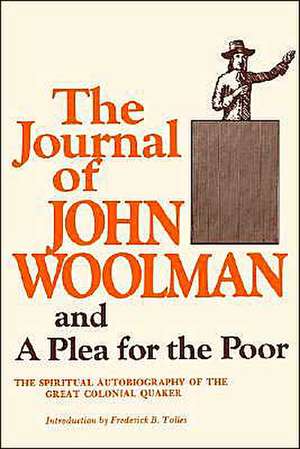The Journal of John Woolman: And a Plea for the Poor
Autor John Woolman Frederick B. Tollesen Limba Engleză Paperback – 30 sep 1972
| Toate formatele și edițiile | Preț | Express |
|---|---|---|
| Paperback (3) | 99.10 lei 6-8 săpt. | |
| Citadel Press – 30 sep 1972 | 99.10 lei 6-8 săpt. | |
| LIGHTNING SOURCE INC – 16 mai 2018 | 138.64 lei 17-23 zile | |
| Macritchie Press – 25 oct 2007 | 236.96 lei 38-44 zile |
Preț: 99.10 lei
Nou
Puncte Express: 149
Preț estimativ în valută:
18.97€ • 19.59$ • 15.78£
18.97€ • 19.59$ • 15.78£
Carte tipărită la comandă
Livrare economică 25 martie-08 aprilie
Preluare comenzi: 021 569.72.76
Specificații
ISBN-13: 9780806502946
ISBN-10: 0806502940
Pagini: 264
Dimensiuni: 155 x 229 x 17 mm
Greutate: 0.4 kg
Editura: Citadel Press
ISBN-10: 0806502940
Pagini: 264
Dimensiuni: 155 x 229 x 17 mm
Greutate: 0.4 kg
Editura: Citadel Press
Textul de pe ultima copertă
The "journal" or spiritual autobiography of John Woolman was the characteristic literary expression of Quakerism in its first two centuries. Woolman's Journal was first published in 1774 (shortly after his death). His life, as recorded by himself, was the finest flower of a unique Quaker culture, Whose focus, as Howard H. Brinton has put it, was not on the literary or plastic arts but on "life itself in home, meeting and community", a life which was an "artistic creation as beautiful in its simplicity and proportion as was the architecture of its meeting houses..." Its distinguishing marks marks were not dogmas but practical testimonies for equality, simplicity and peace. These testimonies, once revolutionary in their social implications, were already becoming institutionalized in Woolman's time as the badges of a "peculiar people". In his quiet way-- he must have been the quietest radical in history-- John Woolman reforged them, tempered them in the stream of love, and converted them once again into instruments of social revolution.
